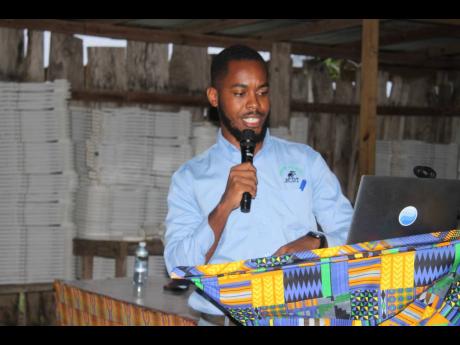The Jamaica Conservation and Development Trust still achieving
THE JAMAICA Conservation and Development Trust (JCDT) was established in 1988 with a mandate to conserve Jamaica’s natural environment.
It might not be visible in mass and social media every day, but it is making strides to fulfil its mandate. And since early last year it has a new executive director in the person of David Walters.
The University of the West Indies graduate has a bachelor of science in geography and a master of science in natural resources management. Since then, he has also completed a training programme with the US Forest Service.
Walters joined the JCDT in 2019 in the capacity as national park manager, but why is he interested in this job? The Gleaner sought to find out after meeting him at the just-concluded 16th Annual International Charles Town Maroon Conference and Festival, in Portland, where he made a presentation.
“I have always been enamoured with the outdoors growing up in rural St Catherine. I’ve always been curious, particularly about how the world works. This inspired me to study geography. I got the opportunity to visit Holywell often as a child and that was also inspiring. I got the opportunity to serve here at JCDT and I wanted to give it my best shot,” he said.
And what does he want to achieve more than any other? “Really, it’s about giving it my best effort to push the needle forward, building on the progress of those before me and hopefully giving those who will come after good legs to stand on,” he replied.
Walters is a relatively young executive director; youth is definitely on his side. The geography of the land which he manages requires such. But, as a young man who is interested in nature, there are many of his age and younger who have absolutely no interest in it, much less its preservation.
So, another question that was posed was: “As a young person yourself, what can you do to get young people to take the protection of the natural environment seriously?”
He replied, “I think more than ever, young people are disconnected from nature and maybe that’s why it’s not seen as important. I would encourage people to get out and explore. The importance and value of nature will quickly become clear, then I think they’ll take it seriously.”
And because the JCDT takes its mandate seriously, it has many ongoing initiatives. It has just wrapped up large grants from the EU and the Biodiversity and Protected Areas Management Programme in which it was able to assist in the restoration of about 50 hectares of National Park lands by planting over 10,000 native trees.
It has embarked upon much community outreach and capacity development for sustainable community tourism. This was supported by the Inter-American Foundation. Through this partnership, the JCDT has been able to develop high-quality community tours with the Windward Maroons and have facilitated the certification of over 40 residents as tour guides.
This non-government organisation and charity has continued to partner with the American Birds Conservation and Birds Caribbean groups to make strides in bird monitoring and conservation. Right now, it is trying to improve the recreational facilities at Holywell and the Blue Mountain Peak, and is in the middle of putting up a new cabin with more to follow. “We thank the Global Environment Facility – Small Grants Programme and JSIF (Jamaica Social Investment Fund) for support here,” Walters added.
“We have partnered with other environmental NGOs (Caribbean Coastal Area Management Foundation and Caribbean Natural Resources Institute) to improve participation in decision-making around budgeting for the forestry sector. This public finance management initiative saw these NGOs forming a coalition of civil society groups that work in and contribute significantly to the forestry sector with the aim being to have a seat at the table in these budgeting conversations in the sector.”
The JCDT is the manager of the Blue and John Crow Mountains National Park, its main preservation zone, which covers 26,251 hectares (65,000 acres), and is inscribed as a World Heritage Site, since 2015. It is also responsible for approximately 28,494 hectares of land around the protected area called the ‘Community Buffer Zone’.
Through the Natural Resources Conservation Authority and the National Environment and Planning Agency, it receives 30 per cent of its annual budget for the national park from the government. It is also supported by grants, donations and income from the national park’s recreational areas to finance the full cost of the park management programme.
“We want to continue to build support for environmental conservation so that, as a country, we together can make the right choices about our natural and cultural heritage,” Walters also told The Gleaner.

